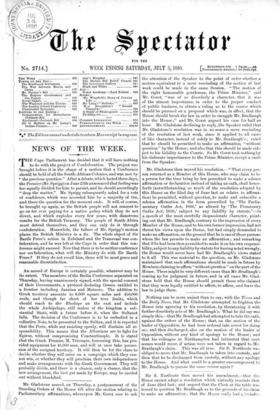Mr. Gladstone then moved his resolution,—" That every per- son
returned as a Member of this House, who may claim to be a person for the time being by law permitted to make a solemn affirmation or declaration instead of taking an oath, shall hence- forth (notwithstanding so much of the resolution adopted by this House on the 22nd day of June last as relates to affirma- tion) be permitted, without question, to make and subscribe a solemn affirmation in the form prescribed by The Parlia- mentary Oaths Act, 1866,' as altered by The Promissory Oaths Act, 1868,' subject to any liability by statute,"—in a speech of the most carefully dispassionate character, point- ing out that Mr. Bradlaugh, contrary to the impression of every Member of the House, and to his own former impression, had not thrust his views upon the House, but had simply demanded to make an affirmation, on the ground that he is one of those persons whom the law permits to make an affirmation ; and remarking that if he had been then permitted to make it on his own responsi- bility, subject to any liability by statute for having acted wrongly. the House would never have had Mr. Bradlaugh's views stated to it all. This was material to the question, as Mr. Gladstone maintained that such affirmations should be made in future by Members claiming to affirm " without question " on the part of the House. There might be very different cases than Mr. Bradlaugh's coming up for judgment in future, and in all cases Mr. Glad- stone held that the House should permit those who claimed that they were legally entitled to affirm, to affirm, and leave the law to judge them.


































